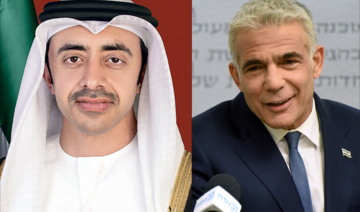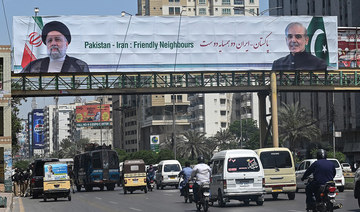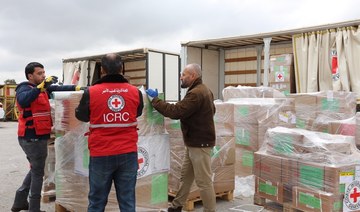GAZA CITY: Israel said it will close its only crossing from the Gaza Strip for workers on Sunday in response to rocket fire, stopping short of conducting retaliatory strikes in an apparent bid to ease tensions.
Two rockets were fired from Gaza at southern Israel on Friday night, one hit the Jewish state and the other fell short and struck near a residential building in northern Gaza.
A third rocket was fired at Israel on Saturday morning, the army said, with no air raid sirens activated for any of the launches.
They followed rocket attacks on Wednesday and Thursday and came as Israeli police clashed with Palestinian protesters at Al-Aqsa Mosque, leaving at least one man hospitalized in serious condition.
Ghassan Alyan, the Israeli coordinator for Palestinian affairs in the Israeli government, said: "Following the firing of rockets from the Gaza Strip, we inform you that on Sunday the Erez crossing will remain closed to workers and merchants only, with the continued entry of humanitarian and other cases. As for the decision to reopen the crossing to workers and traders, a decision will be taken based on an assessment of the situation.”
Following last year's war with Hamas, Israel gradually allowed 12,000 Palestinian workers and merchants to leave Gaza to work in Israel as part of a political understanding to maintain calm in Gaza.
Israeli army radio said the Palestinian losses would be about ILS5 million ($1.53 million) a day due to the workers not being allowed to leave Gaza.
The Erez crossing, which Palestinians call the Beit Hanoun crossing, separates Israel and the Gaza Strip, with Hamas forces controlling the travel procedures and the Palestinian Authority employees coordinating with Israel.
During the past week, tensions have soared in Gaza following Israeli incursions and violence at Al-Aqsa Mosque, but mediators prevented a large-scale escalation.
Employment in Israel is a lifeline for people in Gaza where, according to a recent World Bank report, nearly half of the 2.3 million population is unemployed, AFP reported.
There are currently 12,000 Gazans with work permits in Israel, with the government recently announcing its intention to add another 8,000.
More than 200 people, mostly Palestinians, have been hurt in clashes in and around Al-Aqsa in the past week.
Palestinians have been outraged by massive Israeli police deployment and repeated visits by Jews to the holy site.
Saturday morning prayers passed without incident, with Israeli officials estimating that 16,000 Muslims participated.
Al-Aqsa is Islam's third-holiest site and the most sacred site in Judaism, where it is known as Temple Mount.
Israel is braced for more violence, however.
The unrest in Jerusalem has stirred emotions among Israel's Arab population, with hundreds marching in the Arab-Israeli city of Umm Al-Fahm in support of Al-Aqsa mosque.



























